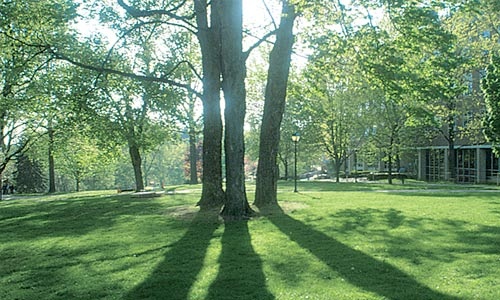Denison University has been recognized for its sustainability initiatives by the Princeton Review Green Colleges List. The list features colleges and universities that “demonstrate a strong commitment to sustainability in their academic offerings, campus infrastructure, activities, and career preparation.” Denison is a repeat performer on this list, which has been in place since 2010. In addition, the college has been selected as AEP’s Ohio Energy Champion in the Large Customer Category. The award recognizes AEP Ohio’s business customers and partners that have demonstrated a strong commitment to energy efficiency.
Denison’s ongoing promotion of sustainability values is seen in programs and initiatives that take place across the campus.
In 2008, Denison made a commitment for all new campus construction to be built to sustainable standards, as set by the LEED rating system. Ebaugh Laboratories is one of four projects constructed to LEED specifications on the Denison campus, the first being the renovation and expansion of the Bryant Arts building, which earned LEED Gold certification in 2010. The expansion and renovation of Chamberlin residence hall and most recently that of the Mitchell Center have also been constructed according to LEED Gold standards.
Denison welcomed full-time sustainability coordinator Jeremy King in 2009. Among his duties, King heads the college’s sustainability committee, which implements efforts to improve the environmental consciousness of the students, faculty and staff, and to continually evaluate the campus facilities and practices to conform to the highest possible sustainability standards.
These improvements have included the installation of solar panels, composting procedures in the dining halls, a bikeshare program, and a campus garden, to name a few. Among the larger efforts are the Sustainability Fellow Program, a student group responsible for educating fellow Denison students on sustainability issues, and the Green Hill Fund, a capital investment that provides financing to implement energy efficiency, renewable energy, and other sustainability projects that generate cost-savings.
“We are quite pleased to be acknowledged by the Princeton Review and AEP for our sustainability efforts,” says King. “We’re seeing more and more on our campus that environmentally conscious and socially responsible actions and decisions are becoming commonplace. Sustainability is part of the fabric that makes up Denison.”
